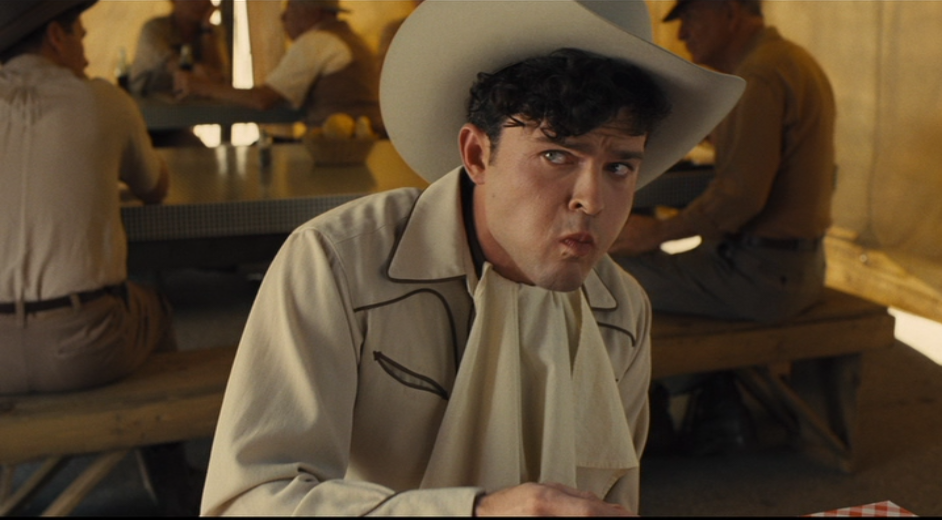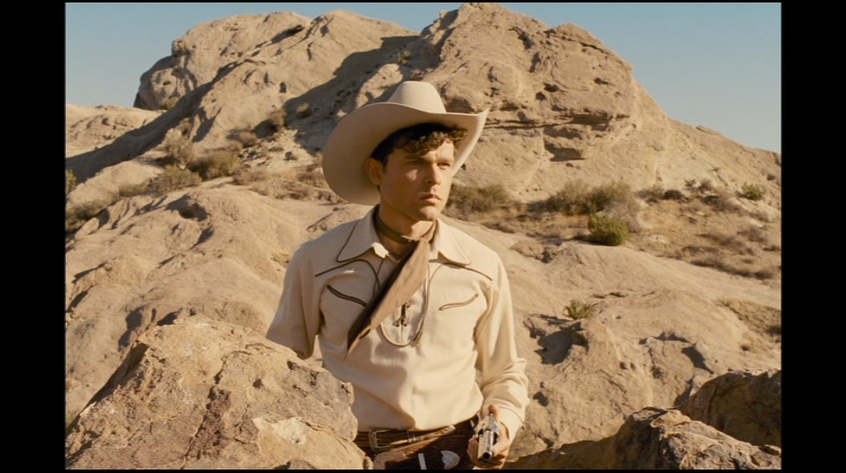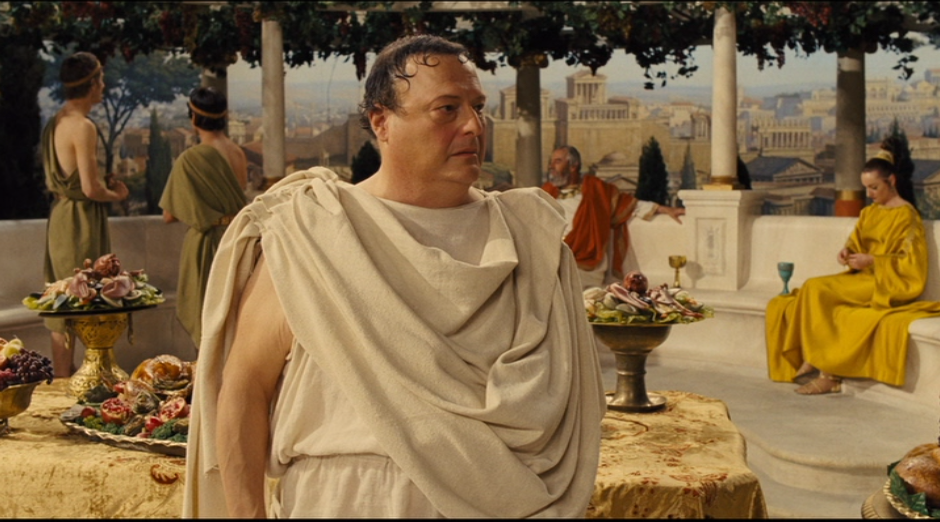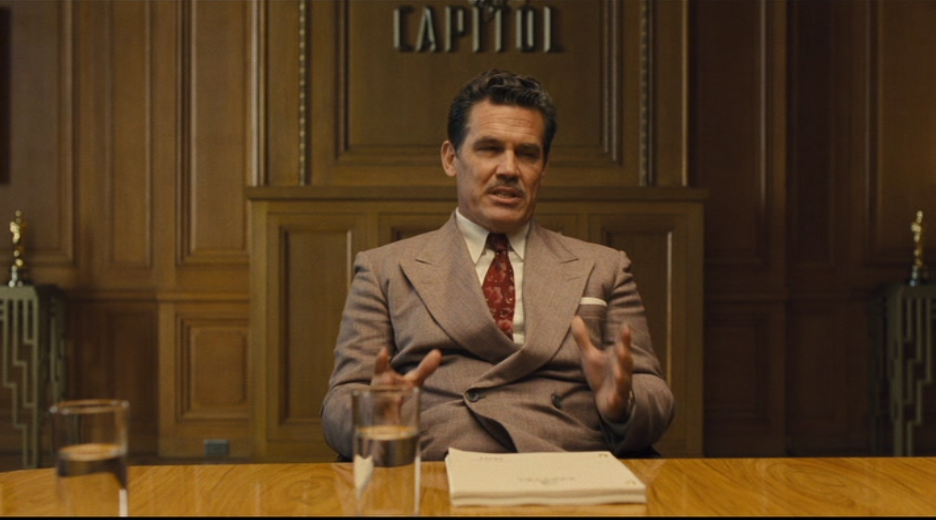Hail, Caesar! part 2
If Nick Schenck is the “capital” of Hail, Caesar!, I think Hobie Doyle, the singing cowboy western star is it’s “little guy.” Hobie is naturally gifted: he can ride a horse and rope a steer, and he has effortless charm and slinky good looks. Hollywood has made him a star, but he has no affect whatsoever — what you see onscreen is exactly who he is. That’s an important distinction, because, alone among the actors presented in Hail, Caesar!, Hobie doesn’t put on airs, doesn’t wear a disguise, isn’t manufactured. He’s the genuine article. He feels lucky to be where he is, lucky to be in pictures, lucky to be famous, and lucky that he’s got people like Eddie Mannix looking out for him.
Hobie is unique among Coen Bros “little guys,” because later in the movie we’ll meet a group of people who believe themselves to be little guys but are not. In many ways, Hail, Caesar! is like a sequel to Barton Fink but told from the other side of the studio executive’s desk. That may, perhaps, signal a change in the Coens’ perspective; once critical of capital as Hollywood outsiders, now they have a more nuanced approach as Hollywood titans — capital, they seem to think now, is just as human as the little guy. (It’s worth noting that True Grit, the Coens’ first and, so far, only blockbuster hit, was also their first screenplay where “capital” is also the narrative’s protagonist.)
Hobie Doyle is shooting a western. More specifically, a 1950s western, full of trick riding and shootouts. Hobie’s character wears a white hat and rides a white horse, named “Whitey,” because the hundreds of programmer westerns that flooded America’s movie screens in the 1950s were simple tales of good vs evil. We watch Hobie negotiate a shootout with a black hat, which ends with him doing a handstand on a galloping horse, a flip around a tree branch to shoot the bad guy and land on another horse, a rearing exclamation point and an upside-down dismount. The director yells “Cut!” and Hobie’s ready to go again. The director insists that they have what they need and “Whitey’s tired.” I type out all this description to show that, on this picture, the primary concern is for the horse, not the star, and that that’s perfectly okay with Hobie, whose movie-star lunch today is “a plate of beans.”
Meanwhile, on the set of Hail, Caesar! ATOTC, shady dealings are afoot. An extra in a toga is fixing to drug Baird Whitlock’s wine, for nefarious purposes. Hobie Doyle will later tell Eddie Mannix that “you can’t trust extras,” because they’re here for a day and gone the next. Again, this is an important change in the Coens’ outlook, that a major movie star is an icon of genuineness and a studio executive is shown as a good man struggling to be better, while an extra is depicted as shifty, conniving and vindictive. And I don’t know if it’s a coincidence or commentary, but the only black person seen in Hail, Caesar! is a “Nubian slave” type standing as an extra in the background, holding a pitcher and looking embarrassed to be in a scene with the two goofball extras who are conspiring to take down Baird Whitlock.
What does Baird Whitlock want? What, for that matter, does Hobie Doyle want? Or, for that matter, what does Eddie Mannix want? Whitlock and Doyle, being movie stars, don’t seem to want, or want for, anything at all. Whitlock seems to love being a movie star, and Hobie Doyle seems to feel lucky just to be there. Eddie Mannix wants to keep Mr. Schenck and Capitol Pictures (or “capital”) successful, which means shepherding (another Christ metaphor) Whitlock and Doyle (and many others) through their mishaps and dilemmas. But Hail, Caesar!, unlike Fargo or Burn After Reading, is not a farce, where each character is pursuing a clearly-defined goal and conflicting agendas collide. Instead, it has a central character whose goal is merely to maintain the status quo, and several peripheral characters who also want to maintain the status quo, because, well, it’s Hollywood in 1951 and the status quo is pretty goddamned great right now for this collection of fortunate white people. “Right now” being the key phrase here, as we shall see.
The scene being shot is a “Roman Bacchanal,” with Baird Whitlock’s character, Autolocus Antoninus, celebrating with a lisping, decadent Roman aristocrat. The scene is meant to parallel Eddie’s world, the decadent status quo of Capitol Studios. The difference, again, is that the Coen Bros seem to like Capitol Studios and the silly entertainments it creates. There is no criticism offered of any of Capitol’s productions. And although the narrative focuses on the idiots at the forefront of the productions, we also see the armies of “little guys,” dedicated professionals, whose livelihoods depend on bringing these Technicolor extravaganzas to the audience, the people Norma Desmond described as “those wonderful people out there in the dark.” The productions of Capitol Pictures, one could say, are like the “divine presence” of Hail, Caesar! ATOTC, messages from on high designed, in their beauty, to arrest travelers on their particular road to Damascus and alter their lives.
In any case, the sneaky extras from the Bacchanal get what they want: they drug Baird Whitlock and abscond with him. Baird Whitlock, whose character in Hail, Caesar! ATOTC goes from Roman general to Christian worshipper, is bound for his own paradigm shift.
While Baird Whitlock is being abducted, Eddie Mannix meets with religious leaders to discuss the depiction of Jesus in Hail, Caesar! ATOTC. There is a lot of comedy in the scene as the various holy men carp about this or that detail of the script, but the scene is, at its root, deadly serious: Eddie’s life is based in presenting motion pictures to the masses, and those images, those stories, have great power. It would be hard for someone of Eddie’s generation to not think of Charlton Heston when picturing Moses, and to not think of Cecil B. DeMille’s biblical epics when thinking of those tales. And the religious figures gathered by Eddie to discuss Jesus are all awed by the casting of Baird Whitlock; that’s the one thing they all agree on. The presentation of the deity is debatable, the power of a major movie star is not.
In spite of being passionate about bringing this “tale of the Christ” to the big screen, Eddie actually doesn’t know that much about Jesus. It surprises him to learn that the divinity of Jesus is a complex, not-easily-understood philosophical concept, that God both is, and is not, the father of Jesus. And, as we will see, the question of fatherhood becomes a minor plot point later in the movie.
Eddie’s motive in gathering this group of religious figures is, of course, commercial: he wants them to “okay” Hail, Caesar! ATOTC so that he can use their approval in Capitol’s marketing materials. He is, in effect, bending the church to needs of capital. The church, dazzled by Hollywood’s ability to weave fantasies and imprint them on the minds of an audience, agrees to be exploited for the studio’s commercial gain.
While Baird Whitlock is being trundled, unconscious, across town, in the back of a station wagon, Hobie Doyle is approached by a PA while eating his plate of beans and told that he’s, out of nowhere, wrapped on his cowboy movie and is to report to the set of Merrily We Dance. Hobie, who, again, just feels lucky to be there, doesn’t think twice about the reassignment, doesn’t even look up from his beans, just says “Okay, how come?” “They’re changing your image,” says the PA. Hobie replies “Okay.” The same goes for being told that he’s scheduled to escort a Latino musical star, Carlotta Valdez, to the premiere of his new movie that evening, again, because “they’re changing your image.” That’s a pretty flabbergasting run of news for a movie star of any ranking, but Hobie doesn’t think twice about it: anything Eddie Mannix and Capitol wants is okay by him. If Hobie is “the little guy” of the narrative, and just feels lucky to be there, then his narrative struggle becomes “How will I, the ‘natural,’ whose gift is my physical skill and genuinely unassuming nature, bear up in this increasingly forced, fake, inappropriate system I live in?”



I’m sure you’re going to get to this, but one thing that struck me about ‘Hail, Caesar!’ is how it’s like a showreel of film genres that are now either out of favor or have evolved beyond recognition: singing cowboy movies, Bible epics, musicals of the Gene Kelly/Busby Berkely era, etc. I wonder how some of the pastiche scenes inform the themes of the movie as a whole.
BTW, following up on your first part: while I agree that Eddie Mannix does not seem to be an obvious Christ figure, doesn’t someone say that Jesus is the intercessor between God and mankind? And isn’t Eddie Mannix the intercessor between the unseen but all-powerful Schenck? I’m not sure if this idea has legs, though…
I just watched the scene again, no one says specifically that Jesus is a conduit between God and Man. And Eddie’s persecution seems to stop at the number of cigarettes he has (which seem to hover around three a day). If we say that Eddie has three cigarettes a day, however, and that cigarettes were often referred to as “coffin nails,” then Eddie would have three “nails” a day. Which I had to reach pretty far into the back of the cupboard to find as a metaphor.
Yeah, I noticed the “showreel of bygone genres” aspect too. It felt like a love letter to that stuff; maybe I misread it, but it felt sincere and respectful, which I can’t say is treatment I would’ve expected from the Coens.
“The difference, again, is that the Coen Bros seem to like Capitol Studios and the silly entertainments it creates.”
This made me realize that Hail, Caesar! may well be the Coens’ Sullivan’s Travels more than any other film they’ve made. (SPOILER WARNING) At the end, Baird Whitlock has gone through a mind-expanding ordeal with the Communists, but it’s ultimately the power of the movies that allows him (and the film he’s making) a moment of true, genuine transcendence. (That moment, when he’s a surprisingly good actor after being more wooden in the earlier scenes, took some real craft and nuance on the part of Clooney and the Coens to pull off.)
(HATEFUL EIGHT SPOILERS: Writing about the ending reminds me of the ending of Tarantino’s The Hateful Eight, which similarly gives the surviving characters a heartfelt moment of transcendence based on a well-crafted forgery.)
The Coens, of course, adore Sullivan’s Travels. The other movie that occurred to me was Stardust Memories, where the alien tells Woody Allen “You want to do a service to mankind? Tell funnier jokes.” Eddie Mannix isn’t Christ, he’s just a storyteller trying to tell better stories. That’s all he can do.
Ah, yeah, good point about Stardust Memories’ philosophy.